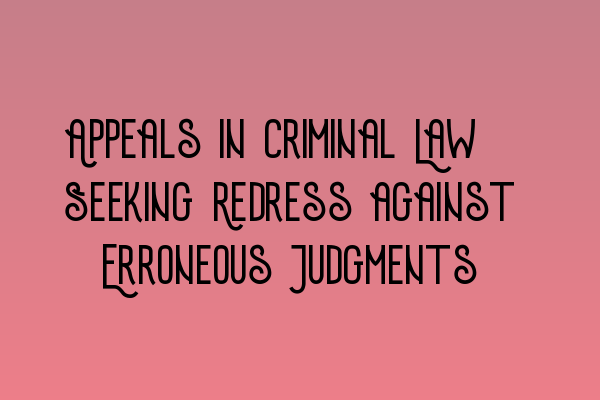Appeals in Criminal Law: Seeking Redress against Erroneous Judgments
When it comes to criminal law cases, the outcome of a trial can have significant consequences on the lives of the accused and their loved ones. However, there are instances where the judgment rendered by the court is believed to be erroneous, leading to an unjust outcome. In such situations, the option of appealing the decision becomes crucial in seeking redress.
Appeals provide individuals with the opportunity to challenge the legal and factual findings made by the trial court. This process allows for a thorough review of the case, ensuring that any errors made during the trial are rectified. By appealing a judgment, individuals can hope to reverse the decision, have the case reassessed, or obtain a more favorable outcome.
The Grounds for Appeal
There are several grounds on which an appeal can be based in criminal law cases. These include:
- Misinterpretation of the law: If the trial court misapplied or misinterpreted the law, leading to an incorrect judgment, it may provide grounds for appeal.
- Procedural irregularities: Any procedural errors, such as the violation of a defendant’s rights or the failure to follow proper legal procedures, can be raised as grounds for appeal.
- New evidence: If new evidence emerges after the trial, which could not have been reasonably discovered earlier, it can be presented as grounds for appeal.
- Ineffective assistance of counsel: If the defendant can prove that their legal representation was incompetent or failed to provide effective assistance, it may be possible to appeal based on this ground.
The Appeals Process
The appeals process in criminal law cases involves several stages and requires the expertise of experienced solicitors. It is essential to seek the advice and representation of a skilled appellate lawyer to navigate through the complex legal procedures.
Initially, the solicitor will conduct a thorough review of the trial record, including the evidence presented, the legal arguments made, and the judgment rendered. This evaluation helps identify potential errors or issues that can be raised on appeal.
Once the grounds for appeal are determined, the solicitor will prepare the necessary legal documents, including the notice of appeal, the appellant’s case, and any supporting documents. These documents will be filed with the appropriate appeals court, and a copy will also be provided to the opposing party.
During the appeals process, both parties will have the opportunity to present their arguments before the court of appeals. The solicitor will advocate on behalf of the appellant, highlighting the legal errors, factual inaccuracies, or procedural irregularities that occurred during the trial. The opposing party will present their counterarguments in defense of the original judgment.
The court of appeals will thoroughly review the case, considering the arguments presented, the trial record, and applicable laws. Based on their evaluation, they will either affirm the original judgment, reverse it entirely, or modify it in some way.
Conclusion
Appeals in criminal law cases play a crucial role in ensuring that erroneous judgments are rectified, providing individuals with an opportunity to seek redress. By understanding the grounds for appeal and navigating the appeals process through the guidance of experienced solicitors, individuals can hope for a fair and just outcome.
If you have questions about the appeals process or need assistance with a criminal law case, please contact us at SQE Criminal Law & Practice Law UK for expert legal representation.
Related articles:
- SQE Exam Prep: Essential Study Materials for Aspiring Solicitors
- Demystifying the Solicitors Qualifying Examination Format
- LLC Formation Made Simple: Step-by-Step Guide for UK Entrepreneurs
- LLC Formation: A Step-by-Step Guide for UK Entrepreneurs
- Business Regulations in the UK: A Comprehensive Overview
